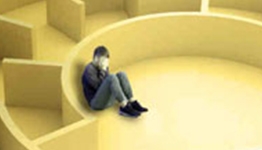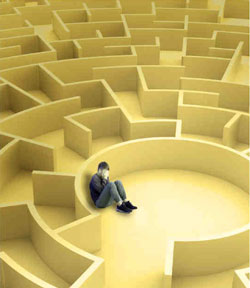Depression I haven’t felt alright for a really long time


Check any of these signs r symptoms that you Have been having:

- Frequent mood swings including agitation, crying anxiety and anger
- Forgetfulness, disorientation or confusion
- Changes in appetite
- Changes in sleep patterns
- Sad or blank look on face
- Suicidal thought
- Social isolation
If you are experiencing any of the signs or symptoms, DON’T hesitate to seek help.
What Can You Do?
Talk to a Doctor.
If you are experiencing the symptoms mentioned above. Make sure you talk to a doctor. Sometimes the symptoms of depression make It hard to take steps to seek help. Is also normal to feel uncomfortable approaching a doctor about depression - seeking help for emotional issues might seem unmanly or weak. However, the sooner depression is diagnosed, the more successfully it can be heated. We best to talk to a doctor without delay and describe your symptoms as clearly as you can.
Get Treatment A doctor may recommend one or more of these types of treatment
- Anti-depressant drugs - These drugs are effective for about two thirds of people who have moderate to severe depression. They we not addictive and their effects are not usually felt for two or three weeks. Patients have to commit to taking them. It may take up to six weeks WPM the benefits kick in.
- Psychological therapy This type of therapy can take many forms ranging from single sessions talking toe doctor to long-term courses of counselling with a psychotherapist. The goal of some types of psychological therapy is to un-loam the negative thinking patterns that lie at the heart of depression.
- Diet and exercise - Diet and exercise can have surprisingly positive effects on your mental health. For example, roving sufficient levels of vitamin B and folic acid in your dial can be helpful. It is also well-known that exercise improves self-esteem and reduces stress revels.
Our Mission to improve the well – being of the patient we serve by providing expert quality care deliver
Adult Psychiatry
The adult psychiatric program is designed to stabilize patient as quickly as possible to return them to functioning. Treatment services are focused on helping patients develop the necessary coping skills to deal with the issue that led to the need for treatment.
Adult Dual Diagnosis
The dual diagnosis program assist patients seeking help for both a mental health disorder coupled with substance abuse or dependence, Therapy builds the patients awareness of behaviours, people and places that must be avoided to maintain long-Term sobriety.
Area of Specialization
The psychiatrics provide treatment of the following disorders, illnesses and behaviours:
- Depression
- Bipolar Disorder
- Self-Destructive Behaviours
- Schizophrenia
- Inability of Function
- Anxiety
- Stress
- Grief and loss
- Boundaries
- Understanding A mental Health Diagnosis
- Coping skills
- Substance use
- Progressive Relaxation
Can I be depressed and don’t know?!!
Yes, you may feel irritable, loss of interest of pleasurable activities you used to do, Chest tightness as if you have a heavy rock on your chest, Forgetfulness, loss of appetite, Disturbed sleep, get tired more easily than normal prefer to sit alone, death wishes or think of death more than usual, unexplained somatic symptoms like digestive problem, repeated headache or body aches not explained by investigations
Here are some facts you have to know about depression
- The lifetime risk of depression is around 20% of population
- The risk in woman is doubled
- First onset is typically in 20 s (if earlier may be as part of bipolar disorder )
- It happens in children by different presentation than adults
- Symptoms checklist
- At least for 2 weeks
- 2 out of 3 main symptoms must be present
- Low mood
- Anhedonia (loss of enjoyment in formerly pleasurable activities
- Decreased energy
Other symptoms
- Reduced concentration and forgetfulness
- Reduced self – esteem
- Guilt feeling and worthlessness
- Feeling of hopelessness
- Decreased appetite and weight (it may be increased appetite and weight in woman)
- Decreased sleep (may be increased sleep in woman)
What are the possible causes of depression?
- Genetic causes
- Environmental causes (work or life stressors in general )
- Drug abuse
- Medical problem
- Some medications
Is there a treatment for depression?
Yes there are different ways of management including medications and psychotherapy session
Are the antidepressant medications addictive?
There is a common false belief between people that all psychiatric medications are addictive, but the truth is it has never been addictive and patient can stop medications under supervision of his psychiatrist after complete remission.



